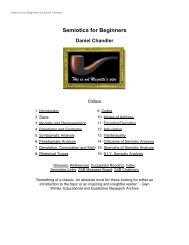Semiotics for Beginners by Daniel Chandler
Semiotics for Beginners by Daniel Chandler
Semiotics for Beginners by Daniel Chandler
You also want an ePaper? Increase the reach of your titles
YUMPU automatically turns print PDFs into web optimized ePapers that Google loves.
<strong>Semiotics</strong> <strong>for</strong> <strong>Beginners</strong> <strong>by</strong> <strong>Daniel</strong> <strong>Chandler</strong><br />
Whether they consciously intended or not doesn't really matter. It's a good example of the perpetual<br />
sliding of the signified under a signifier, actually.'<br />
Wilcox chewed on this <strong>for</strong> a while, then said, 'Why do women smoke them, then, eh?' his<br />
triumphant expression showed that he thought this was a knock-down argument. 'If smoking Silk<br />
Cut is a <strong>for</strong>m of aggravated rape, as you try to make out, how come women smoke 'em too?'<br />
'Many women are masochistic <strong>by</strong> temperament,' said Ro<strong>by</strong>n. 'They've learnt what's expected of<br />
them in a patriarchical society.'<br />
'Ha!' Wilcox exclaimed, tossing back his head. 'I might have known you'd have some daft answer.'<br />
'I don't know why you're so worked up,' Said Ro<strong>by</strong>n. 'It's not as if you smoke Silk Cut yourself.'<br />
'It'll pass the time,' he said.<br />
'No, I smoke Marlboros. Funnily enough, I smoke them because I like the<br />
taste.'<br />
'They're the ones that have the lone cowboy ads, aren't they?'<br />
'I suppose that makes me a repressed homosexual, does it?'<br />
'No, it's a very straight<strong>for</strong>ward metonymic message.'<br />
'Metawhat?'<br />
'Metonymic. One of the fundamental tools of semiotics is the distinction<br />
between metaphor and metonymy. D'you want me to explain it to you?'<br />
'Metaphor is a figure of speech based on similarity, whereas metonymy is based on contiguity. In<br />
metaphor you substitute something like the thing you mean <strong>for</strong> the thing itself, whereas in<br />
metonymy you substitute some attribute or cause or effect of the thing <strong>for</strong> the thing itself'.<br />
'I don't understand a word you're saying.'<br />
'Well, take one of your moulds. The bottom bit is called the drag because it's dragged across the<br />
floor and the top bit is called the cope because it covers the bottom bit.'<br />
'I told you that.'<br />
'Yes, I know. What you didn't tell me was that "drag" is a metonymy and "cope" is a metaphor.'<br />
Vic grunted. 'What difference does it make?'<br />
'It's just a question of understanding how language works. I thought you were interested in how




